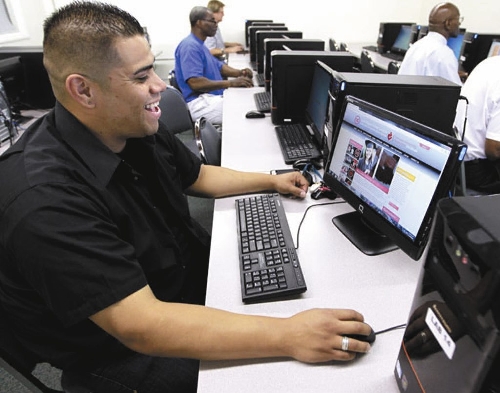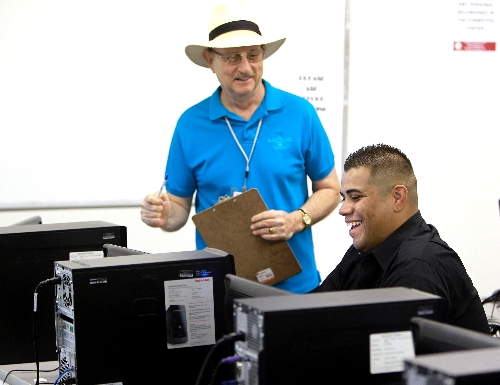Las Vegas Urban League helps put felons back to work



Nevada is notorious for being among the worst.
We’ve had the dishonor of being listed among the worst U.S. states in terms of our health, teen pregnancy rate, public school system, unemployment rate, economy — we could go on and on.
But it’s not all dark clouds and gloomy forecasts. Nevada has long done better than most when it comes to one issue: recidivism rates. Statistics show felons released from the state’s prisons return there in smaller percentages than in most other states.
Nationally, more than 40 percent of those released from prison go back there within three years. The number in Nevada is just over 22 percent.
Officials who work with released inmates say that’s not necessarily because Nevada is doing something right while other states are doing something wrong. The lower statistic comes with a hefty helping of qualifiers. Among them:
■ Nevada incarcerates more lower-level offenders, who spend less time in prison and are less likely to re-offend.
■ Released felons in Nevada spend comparatively less time on parole — the state grants parole less often than many states — so they are less likely to wind up back in prison because of a parole violation.
■ Nevada is a transient state, and many released felons simply go home.
“A lot of them come from California, commit a crime in Nevada, then leave Nevada” after they are released from prison, said Bradford Glover, an administrator of statewide re-entry services for the state’s Department of Corrections.
The department doesn’t include in its recidivism statistics former inmates who get incarcerated in other states.
Greg Salcido, 32, is one of those former inmates originally from California. But he decided to stay in Las Vegas upon his release from prison in October. Salcido, who spent 15 months behind bars after police discovered him in a stolen vehicle, is trying to rebuild his life here and come out on the good side of statistics.
It isn’t easy.
“It’s very frustrating and intimidating to try to get back into the workforce when you’ve got a felony,” he said. “They ask you, ‘Have you ever been in trouble?’ And I don’t want to lie.”
Salcido spent time in jail before for stealing items he then would sell to fuel a drug habit. Prison was different.
“It’s very sad,” Salcido said. “You meet some guys in there you could tell did one thing wrong, made one mistake, and are in there for 15 years. I’m the type of person who sees the good in people.”
But Salcido is grateful for the time he spent locked up. It helped him get straight, for one thing.
“It was honestly the best thing,” he said. “I don’t regret it.”
And he has managed to find work as a server at a wedding chapel, with help from the nonprofit Las Vegas Urban League’s Re-Entry of Ex-Offenders program.
The program provides intensive case management, job skills training, mentoring and other services.
It is one of Nevada’s dozens of nonprofit or faith-based re-entry programs for ex-offenders that Glover said are crucial to helping former inmates succeed on the outside.
Such organizations help “provide them with vocational training while they are still in” prison, Glover said.
They also make sure inmates have up-to-date identification, Social Security cards and other materials they will need to get a job, which helps them stay out of trouble.
The Urban League’s program helped Salcido get the work cards he needed for a job as a server.
The program helped him change his attitude about life after prison.
“I thought, ‘I’m not going to get a job. Nobody wants me,’ ” he said. Urban League staffers “make you feel wanted.”
The biggest challenge for people like Salcido, and for the programs that help ex-inmates, is finding employment.
“It’s very difficult in this economy,” said Anthony Scillia, program manager for the Urban League’s ex-offender program. “It’s very difficult when you have someone who has been locked up most of his life, doesn’t have an education, has no work history.”
Program staffers, who have connections with local businesses willing to offer ex-inmates a second chance, help participants with vocational training, resumes and anything else they might need to succeed.
The program tries to make initial contact with participants while they are still incarcerated, to “develop rapport,” Scillia said.
The program has more than 260 participants and a 75 percent retention rate.
Salcido heard about the program before he was released.
“That sounds like something I should do,” he told himself. “Ever since I stepped through these doors, it’s been worth it.”
He is now looking for a second job while living with his mother, who raised him on her own.
“She’s my rock,” he said. “She taught me right from wrong. I just went off in my own little world.”
Someday, Salcido would like to go back to school to study fashion design. But that’s a long-term goal. In the short-term, he wants to focus on working hard, maintaining his sobriety and maybe serving as an example to other former inmates, he said.
“I’m so blessed, and I’d love to spread some hope out there.”
Contact reporter Lynnette Curtis at
lcurtis@reviewjournal.com or 702-383-0285.












